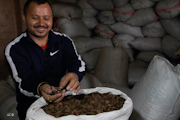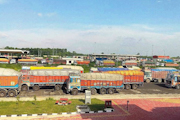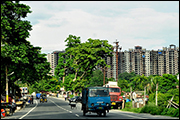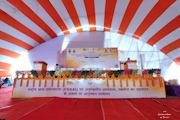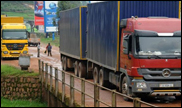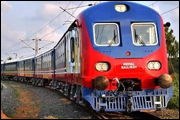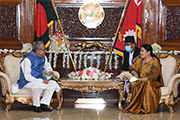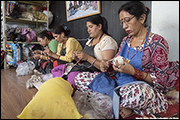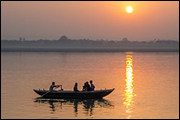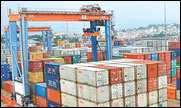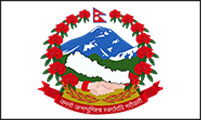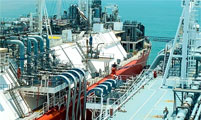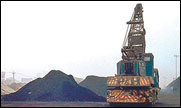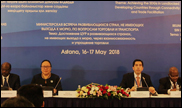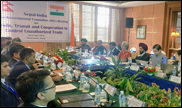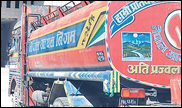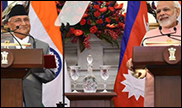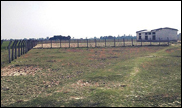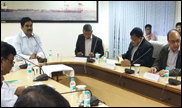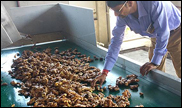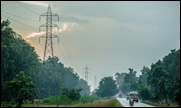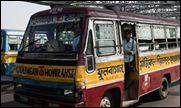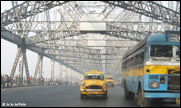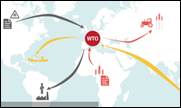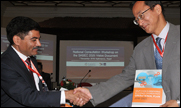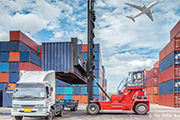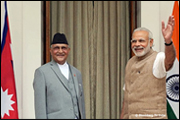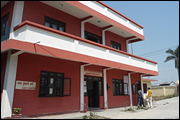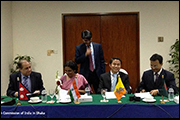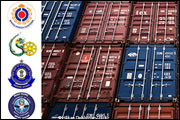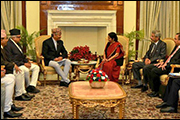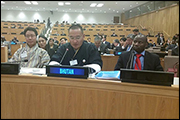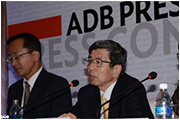Trade Facilitation Results
Trade facilitation focuses on removing barriers to the international movement of goods to lower trade costs, at and around the borders, and along the supply chain, to make countries more competitive in regional and global markets. In the SASEC subregion, bottlenecks in trade facilitation are the leading non-tariff barriers that constrain intraregional trade. SASEC initiatives in trade facilitation aims to make cross-border trade and transport in the subregion faster, cheaper, and more predictable, while maintaining the security of the supply chain and ensuring the effectiveness and efficiency of the institutions involved.
TRANSPORT NEPAL
NEWS & MULTIMEDIA
total items: 80The new Nepal Trade Integration Strategy (NTIS) 2023 expands the list of promising export products and services from Nepal to 32, from 12 in the NTIS 2016. Implemented in July, the new products in the latest trade strategy include electricity in the service export category. NTIS 2023 aims to increase the country’s trade-to-GDP ratio to 55% by 2026.
ADB approved a project loan to support continuing reforms in Nepal customs. The financing assistance worth $50 million will enhance policy reforms in customs and logistics to help boost the country’s domestic and international trade. The program will help implement the Government of Nepal’s Customs Reform and Modernization Plan 2021-2026 and improve the country's trade logistics through the preparation and implementation of a new Trade Logistics Policy 2022.
Bangladesh has opened its Banglabandha Land Port for the import of acrylic yarn from Nepal, ending a 17-year-long restriction. A statutory regulatory order was issued by Bangladesh's National Board of Revenue on the matter.
The potential of the Siliguri corridor and its surroundings to be developed as a logistics hub for India’s northeastern region, and Bangladesh, Bhutan, and Nepal, was emphasized by the CII at Logi Connect 2022. Developing Siliguri as a logistic hub would facilitate movement of goods to other states of India and its neighboring countries.
The Food Safety and Standards Authority of India (FSSAI) inaugurated the new National Food Laboratory (NFL) in Raxaul, Bihar, on 5 June 2022. The facility is equipped with advanced technology and infrastructure, capable of testing food samples exported from both India and Nepal.
Nepal’s Ministry of Finance launched the e-payment system for customs duty on the 70th International Customs Day. The system enables traders to pay their customs duty online. According to Mr. Janardan Sharma, Minister for Finance of the Government of Nepal, this will facilitate the collection of revenues.
The Dhaka Chamber of Commerce and Industry (DCCI) and the Nepal Confederation of Nepalese Industries (CNI) signed a memorandum of cooperation. Mr. Tapan Kanti Ghosh, Commerce Secretary of the Government of Bangladesh, spoke as the chief guest. In his remarks, he noted that the Preferential Trade Agreement between Bangladesh and Nepal is in the final stage.
The Dhaka Chamber of Commerce and Industry (DCCI) and the Nepal Confederation of Nepalese Industries (CNI) signed a memorandum of cooperation. Mr. Tapan Kanti Ghosh, Commerce Secretary of the Government of Bangladesh, spoke as the chief guest. In his remarks, he noted that the Preferential Trade Agreement between Bangladesh and Nepal is in the final stage.
The Ministry of Finance of the Government of Nepal launched the Sixth Customs Reform and Modernization Plan. It emphasizes (i) trade facilitation, (ii) realistic revenue collection, (iii) protection and security of society, (iv) automated customs system, and (v) organizational development and capacity building.
A Letter of Exchange for the revision of the Railway Service Agreement between Nepal and India proposes to allow all authorized private container train operators from India and Nepal to utilize the Indian Railway network to transport freight containers for Nepal's imports or exports, and transport goods to and/or from other border points besides Raxaul (India)/Birgunj (Nepal).
The Governments of Bangladesh and Nepal signed a Memorandum of Understanding (MoU) on Strengthening Sanitary and Phytosanitary (SPS) Cooperation on 22 March 2021. SPS, as well as technical barriers to trade (TBT), serves as critical nontariff measures that constrain trade in the SASEC subregion.
A webinar organized by CUTS International on 30 October 2020 deliberated the findings of the project, ‘Gender Dimensions of Trade Facilitation in the Bangladesh, Bhutan, India and Nepal (BBIN) Subregion.’ The work undertaken by CUTS reveals that the absence of gender responsive trade facilitation measures helps exacerbate gender inequality.
Inland waterways is an important pillar of ‘Arth-Ganga,’ a project that aims to channelize economic activity along the banks of Ganga River to promote inclusive growth for India and generate enormous employment opportunities. The project is being implemented by the Ministry of Shipping of the Government of India.
The Kolkata Customs of the Government of India has granted an 84.33% subsidy for Nepali cargo duty insurance. Nepali importers were also provided the flexibility to buy insurance from private companies beginning 12 September.
The Fifth Meeting of the India-Nepal Joint Commission reviewed bilateral relations, and areas of cooperation. The delegations expressed satisfaction over progress of ongoing projects. They agreed to expedite the early completion of remaining agreed projects, and pledged to conclude the review of treaties and agreements related to the trade, transit, and rail services early.
The Government of Bangladesh is considering the construction of a new pipeline to import liquefied natural gas (LNG) from India. According to Mr. Nasrul Hamid, State Minister for Power, Energy, and Mineral Resources of the Government of Bangladesh, the country’s Gas Transmission Company Limited plans to install the pipeline near the Satkhira border. This will help supply fuel-based power plants and industries in the southeastern region of Bangladesh.
The Nepal Intermodal Transport Development Board (NITDB) is upgrading the inland container depot in Birgunj, Nepal, to give it the capacity to handle dusty cargo, such as cement clinker and fly ash. NITDB is also planning to develop railway tracks to be linked directly to the new warehouses.
The 9th Annual Ministerial Meeting of Landlocked Developing Countries (LLDCs) on Trade and Transport was held to discussed key issues in transport, transit cooperation, trade, and trade facilitation among LLDCs. Bhutan and Nepal sent delegations to the Meeting. They highlighted initiatives being taken to connect their countries to the global market, including bilateral agreements in the Bangladesh-Bhutan-India-Nepal subregion and the SASEC Trade Facilitation Program.
The Governments of India and Nepal held an India-Nepal Inter-Governmental Committee Meeting on Trade, Transit, and Cooperation to Control Unauthorised Trade, led by Commerce Secretaries of the two Governments. They discussed bilateral trade, transit, and economic relations, and agreed to conclude measures to further improve bilateral trade and investment ties.
Around 375 oil tankers bringing in fuel to Nepal from Indian Oil Corporation depots in Gonda in Uttar Pradesh, and Banthara, to the Nepalgunj and Bhairawa border points will be required to install a security locking system to eliminate pilferage in transit, shared Nepal Oil Corporation spokesperson Mr. Birendra Kumar Goit.
Nepal Prime Minister KP Sharma Oli emphasized the high importance Nepal places upon its relationship with India, and Nepal's desire to further strengthen this bilateral partnership, in a meeting with India Prime Minister Narendra Modi. Prime Minister Oli visited India on 6-8 April 2018, upon the invitation of India’s Prime Minister. The two Prime Ministers jointly inaugurated the Integrated Check Post (ICP) at Birgunj, Nepal, and issued three joint statements of cooperation.
The Kolkata Port Trust is working to increase the port’s capacity, ease congestion, and reduce paperwork requirements for traders. The port, which handles most of Nepal’s third-country trade, is improving its physical infrastructure and cargo handling system.
The Government of India has appointed a contractor to build the integrated check post (ICP) in Nepalgunj, Nepal, on the India-Nepal border. Timeline set for building and completion is two years. The ICP on the Nepalgunj-Rupaidiha (India) border would facilitate improved cross-border connectivity.
Bangladesh is looking to expand the market share of its goods in Nepal. Ms. Mashfee Binte Shams, Bangladeshi Ambassador to Nepal, reviews the opportunities for Bangladesh manufacturers and explains what her country is doing to promote its products in Nepal. This interview of Ms. Shams, conducted by Ibrahim Hossain Ovi, first appeared on Dhaka Tribune.
A meeting between the Government of Nepal's Ministry of Commerce (MoC), Ministry of Foreign Affairs (MoFA), Visakhapatnam (Vizag) port authorities, and the Government of India discussed the possibility of implementing paperless trade procedures at Vizag port for Nepal’s third country trade. In follow up to this, the Government of Nepal also held a meeting with its stakeholders on 18 February 2018.
Exporters from Nepal shipped over 35 truckloads of ginger to Bangladesh between mid-December 2017 to January 2018. This volume of ginger traded by Nepal to Bangladesh is the largest it has exported to a third country in over a decade. The Treaty of Transit between India and Nepal facilitates movement of Nepal's third country trade with and through Bangladesh, via India.
Nepal has decided to join the Bay of Bengal Initiative for Multi-Sectoral Technical and Economic Cooperation (BIMSTEC) grid interconnection, a move meant to help facilitate trade in electricity and take full advantage of available energy sources. Nepal is expected to sign an MOU to join the grid interconnection at the Third BIMSTEC Energy Ministers' Meeting.
The Asian Development Bank has approved a $21 million loan to support the Government of Nepal’s efforts to simplify, harmonize, and modernize the country’s trade processes, under the South Asia Subregional Economic Cooperation. The program will help the country to promote and diversify exports, and help it fulfill its commitments to international customs standards.
Mr. Prabir De, Professor at the Research and Information System for Developing Countries, discusses how the Bangladesh-Bhutan-India-Nepal (BBIN) subregional grouping’s focus to bridge connectivity gaps is crucial to reducing poverty in the region. He highlights the pressing need to begin implementing comprehensive trade facilitation and connectivity measures in the BBIN subregion, and remarks how success of the BBIN initiative is important to move broader regional integration initiative
The Nepal-Bangladesh Youth Conference 2017 was held in Kathmandu, Nepal, to discuss possible ways to increase bilateral trade between Nepal and Bangladesh. The environment and the economic and business sectors were among the topics tackled at the conference.
Bangladesh has the potential to become a transport hub for India, Bhutan, Nepal, Maldives, Sri Lanka, and Myamar, according to Mr. AMA Muhith, Finance Minister, Bangladesh. Turning Bangladesh into a regional and transshipment hub would enhance economic cooperation and result in collective economic growth for the countries, Mr. Muhith said at the SASEC Finance Ministers’ Meeting in New Delhi, India.
The World Trade Organization (WTO) Trade Facilitation Agreement (TFA) is getting closer to coming into force after Mr. Deepak Dhital, Nepal’s Ambassador to the WTO, submitted his country’s instrument of acceptance to WTO Director-General Roberto Azevêdo on 24 January 2017. Nepal is the 14th least developed country to ratify the TFA, which is expected to help reduce trade costs for WTO member countries.
A railway network linking India and its neighboring countries, Bangladesh, Bhutan, Myanmar, and Nepal, is being considered by the Government of India, according to India Railway Minister Suresh Prabhu. Developing railway connectivity will increase employment, interaction, trade, and tourism.
The interactive session “Harnessing Regional Cooperation in South Asia” held at the Annual Meeting of the World Economic Forum discussed how regional economic cooperation is helping accelerate growth and development. Bangladesh Prime Minister Sheikh Hasina emphasized continuous initiatives, in economic cooperation in South Asia, including SAFTA and SASEC. India Minister of State for Commerce and Industry Nirmala Sitharaman lauded initiatives to boost connectivity.
India is set to join the Transports Internationaux Routiers (TIR), or International Road Transport Convention in its bid to establish seamless trade connectivity with Southeast Asia and Eurasian countries. Through the TIR Convention, India could access Eurasia via the International North-South Transport Corridor. TIR would also give India an advantage in trade with fellow signatories of the Bangladesh, Bhutan, India, Nepal (BBIN) Motor Vehicles Agreement.
Nepal's Department of Customs is set to present the Customs Reform and Modernization Strategies and Action Plan (CRMSAP) 2017-2021 on 26 January 2017, International Customs Day. The CRMSAP 2017-2021 aims to implement provisions of the Revised Kyoto Convention, the World Trade Organization Trade Facilitation Agreement, and the Single Window System.
The National Academy of Customs, Excise and Narcotics (NACEN) held a capacity-building program for 35 Customs Officers from Nepal. The 5-day program discussed various Customs-related topics, including Customs valuation; World Trade Organization provisions; Customs reform; and use of risk management.
Nepal’s Parliament ratified the World Trade Organization (WTO) Trade Facilitation Agreement (TFA) on 13 January 2017, drawing up the instrument of acceptance for the WTO TFA, whose implementation will help expand trade and attract foreign direct investment in Nepal by increasing transparency and effectiveness of the trading process.
The Directorate of Revenue Intelligence under the Central Board of Excise and Customs organized the 4th Regional Customs Enforcement Meeting in New Delhi, India, as part of its Founding Day celebrations. The Heads of Customs Enforcement from Sri Lanka, Myanmar, Bangladesh, Nepal, Bhutan, Mauritius and Maldives were invited to participate in the said Meeting, which discussed issues of mutual concern, noted the need to share information and activate channels of coordination.
The SASEC project portfolio has surpassed the $9 billion mark with the December 2016 approval of Nepal’s SASEC Roads Improvement Project, worth $256.5 million. There are now 44 SASEC investment projects worth a cumulative $9.13 billion. During 2016, seven projects have been approved for a total of $2.37 billion.
A notification for moving export and import cargo to and from Nepal through Visakhapatnam (Vizag) Port in Andhra Pradesh, India, was issued by the Nepal Department of Customs. This follows the go-ahead given by the Central Bank of Nepal to issue letters of credit to clients using Vizag Port to bring in trade. Furthermore, the Government of Nepal is considering establishing a consulate in Andhra Pradesh to ensure more efficient utilization of Vizag Port.
Government officials of Bangladesh and Nepal will conduct a joint survey on a potential road route under the Bangladesh-Bhutan-India-Nepal (BBIN) Motor Vehicle Agreement (MVA), starting from5 December 2016. It will check road conditions, length of travel, and necessary infrastructure to ensure seamless movement of vehicles.
EPing, an online alert system for updates on the latest information on regulatory requirements for international trade, was launched by the United Nations Department of Economic and Social Affairs, the World Trade Organization, and the International Trade Centre. The system enables access to WTO member notifications on TBT and SPS measures, and facilitates dialogue among the public and private sector in the early stages of potential trade issues.
The SASEC Operational Plan, which aligns and brings together all SASEC sectoral strategies, was launched in Kathmandu, Nepal. With 37 of the 200 planned projects set to be implemented in Nepal, the Government’s policy reform efforts to integrate with global markets is set to receive a significant boost.
In recent years, countries in South Asia have shown increasing commitment to deepening regional cooperation through bilateral agreements and regional initiatives, including the Bangladesh-Bhutan-India-Nepal Motor Vehicles Agreement. This commentary by Ms. Nahela Nowshin of the Centre for Policy Dialogue discusses the importance of regional initiatives in South Asia, as well as the need to promote dialogue on matters of regional cooperation and connectivity.
A new Customs inspection and verification procedure is changing how trade is conducted among South Asian countries. Through the BBIN Motor Vehicles Agreement, cargo and passenger vehicles may now pass through the four countries more smoothly. The simplified process greatly benefits apparel-centric economies, making South Asia more competitive for both global and domestic brands.
The Asian Development Bank is helping countries in the SASEC subregion harmonize two technical non-tariff measures, Sanitary and Phytosanitary (SPS) Measures and Technical Barriers to Trade (TBT), to enhance intraregional trade. Under this initiative, a national diagnostic study on SPS and TBT will be conducted in the six SASEC member countries, to be led by core committees formed by the six governments, in consultation with trade experts.
The Government of Nepal launched the Nepal Trade Portal, a one-stop shop for official information on trade procedures and requirements for Nepali business. Featuring essential information for traders, the online portal aims to improve the way trade and business is conducted, and to facilitate cross-border trade by providing easy access to legal documents, forms and procedures in both English and Nepali.
The Nepal Parliament ratified the Protocol of Amendments to the International Convention on the Simplification and Harmonization of Customs Procedure (Revised Kyoto Convention) on 9 September 2016, tabled by Mr. Krishna Bahadur Mahara, Nepal Deputy Prime Minister and Finance Minister. The ratification is expected to boost the capacity of Nepal Customs to facilitate trade.
A new chapter in trade relations and people-to-people contact between Bangladesh, Bhutan, India, and Nepal (BBIN) began on 5 September 2016, as a Bangladeshi cargo truck rolled into the Customs Inland Container Depot, Patparganj, Delhi. Though the vehicle entered India through Petrapole Land Customs Station, Customs clearance was done at the ICD, Patparganj, as part of a trial run of the BBIN Motor Vehicles Agreement.
Finance Ministers from the eight South Asian Association for Regional Cooperation (SAARC) member states are pushing for the formation of a South Asian Economic Union (SAEU) to ensure larger inflow of investments, higher trade volumes, and energy generation. The ministers highlighted the need to fast-track the formation of the SAEU to help boost the inflow of investments and trade volumes.
The Bangladesh-Bhutan-India-Nepal (BBIN) Motor Vehicles Agreement (MVA) is set to boost infrastructure development in the BBIN subregion. Bangladesh will see significant increase in cargo movement, enabling India to access its Northeast region, and helping facilitate third-country trade of landlocked Bhutan and Nepal. However, major investments in infrastructure are needed to maximize Bangladesh’s potential to become a transport and transshipment hub.
Mr. Nitin Gadkari, Road Transport and Shipping Minister, India, led the inauguration of the Varanasi-Haldia inland waterway route, laying the foundation stone for an inland waterway terminal, and flagging off a trial run of two cargo vessels from Varanasi to Haldia Port near Kolkata, a route that touches Nepal’s two major rivers—Koshi and Gandaki.
Nepal private sector representatives, including members of the Nepalese Chambers of Commerce and Industry, the Nepal Freight Forwarders' Association, and India port authorities from Kolkata and Visakhapatnam, met to discuss measures needed to bring India's Visakhapatnam Port into full-fledged operation for Nepal's third country trade, and simplifying clearing processes for Nepal-bound cargoes.
Freight forwarders in Nepal have urged early operationalization of the Vizag Port in India as an alternative port for Nepal trade. According to the Nepal Freight Forwarders Association, ocean freight costs, Customs house agent charges, and other logistic costs can be reduced by directing trade through Vizag Port.
South Asia Subregional Economic Cooperation (SASEC) investment projects increased to a cumulative $7.66 billion in the areas of transport, energy, trade facilitation, and ICT with the recent approval of India’s Bihar New Ganga Bridge Project. To date, 40 SASEC-supported projects are helping member countries strengthen regional connectivity infrastructure, promote economic growth, and foster regional cooperation. In addition, there are now 71 technical assistance projects worth $66.14 mi
Implementation of the Bangladesh, Bhutan, India and Nepal (BBIN) Motor Vehicle Agreement (MVA) may start in December, according to Bangladesh Road Transport and Bridges Minister Obaidul Quader, while speaking at a closing ceremony of a drivers' training on road safety.
Bangladesh, Bhutan, India and Nepal (BBIN) signed a landmark Motor Vehicles Agreement (MVA) meant to allow smooth passage of goods and passenger vehicles in each other’s territories. In this blog post, Sanjay Kathuria, Lead Economist and Coordinator, South Asia Regional Integration, Trade and Competitiveness Global Practice, World Bank, asks if South Asia is truly ready for such a regional agreement.
Mr. Hun Kim, Director General, South Asia Department, ADB, describes how partnership of 6 South Asian countries through the ADB-supported South Asia Subregional Economic Cooperation (SASEC) Program is helping propel economic growth in South Asia, amidst an uncertain regional and global economic climate, by working to increase trade volumes to reduce the number of impoverished people in the region.
Meetings between Customs officials from SASEC member countries reaps benefits for the SASEC subregion and beyond, providing a platform for officers to decide the next steps in improving cross-border coordination and cooperation to resolve bottlenecks for trade at the borders. An Asian Development Bank (ADB) blog post by Ms. Rose McKenzie, Senior Regional Cooperation Specialist, Regional Cooperation and Operations Coordination, South Asia Regional Department, ADB, is shared.
Cargo bound for Nepal was flagged off symbolically from Visakhapatnam Port in India on 24 June 2016, signaling to traders that the port is ready to facilitate exports and imports as Nepal's second gateway port. A delegation from Nepal is in Visakhapatnam to see through implementation of the agreement and discuss modalities of cargo transit with Customs officials from India.
The Bangladesh-Bhutan-India-Nepal (BBIN) Motor Vehicles Agreement is a landmark framework agreement signed by the transport ministers of the BBIN countries last June 2015 in Thimphu, Bhutan. Mr. Ronald Butiong, Director, Regional Cooperation and Operations Coordination, South Asia Regional Department, Asian Development Bank (ADB), describes how it is paving the way for a more integrated and more prosperous South Asian region in an ADB blog entry.
Bhutan, Nepal, and Sri Lanka have expressed interest in adopting best practices of the Indian Trade Portal in setting up their own trade portals to promote international trade. Trade portals to be set up by Bhutan and Nepal will also be useful for cargo being routed through India, and will contribute to the common documentation system needed to implement the World Trade Organization's Trade Facilitation Agreement.
Nepal's private sector stakeholders are seeking a dedicated railway line from Nepal to Indian sea ports, including the Visakhapatnam Port, to reduce the cost of trade in the country. Mr. Rajan Sharma, Transport and Transit Committee Chair of the Federation of Nepalese Chambers of Commerce and Industry, noted that direct access to India's Visakhapatnam Port could bring transformational changes to Nepal's economy.
A World Customs Organization (WCO) Subregional Workshop on Transit Corridors in South Asia considered improvement of regional transit regimes in the region. Progress of the Bangladesh, Bhutan, India and Nepal (BBIN) Motor Vehicle Agreement, as well as national experiences of Japan, Switzerland and Malawi in implementing efficient transit regimes, was discussed.
Dr. Selim Reihan notes that drivers of political economy can impact the region's integration agenda. In this essay, Dr. Raihan highlights the importance of exploring the political economy of regional integration to generate a better assessment of the factors driving and constraining regional integration, and create broader awareness among stakeholders to stimulate a more realistic and effective regional policy design and processes.
India Prime Minister Narendra Modi and Nepal Prime Minister KP Sharma Oli—on his first state visit since assuming office in October 2015—held comprehensive talks in New Delhi, and witnessed the signing of several agreements, including letters of exchange on transit and rail. These agreements will help promote Nepal's trade with third countries by making transport more efficient and less costly.
International Customs Day is observed in honor of the establishment of the World Customs Organization, an independent intergovernmental body, on 26 January 1952. Nepal Department of Customs shares the week-long program planned in Nepal to mark the occasion.
The third meeting of the Joint Working Group on Subregional Cooperation between Bangladesh, Bhutan, India and Nepal (BBIN) on Connectivity and Transit and Water Resources Management and Power/Hydropower deliberated new initiatives for deepening cooperation. Discussion centered around progress made under the BBIN Motor Vehicle Agreement and the proposed BBIN Rail Agreement.
A proposed meeting of SAARC Transport Ministers in Kathmandu, Nepal aims to discuss the SAARC Motor Vehicle Agreement and SAARC Regional Railway Agreement, ahead of the 19th SAARC Summit to be held in the latter part of 2016 in Pakistan. The proposed regional transit agreements aim to promote transport connectivity in the region, and to enhance regional economic cooperation and integration.
South Asia is set to play a strategic role in Asian integration. This commentary by Mr. Ganeshan Wignaraja, Advisor in the Asian Development Bank’s Economic Research and Regional Cooperation Department, shares how linking emerging South Asia with the more developed member countries of the Association of South East Asian Nations will transform regional economies through development of regional connectivity, and create a huge regional market of 2-3 billion people.
The exchange of export-related data between designated adjacent border crossing points in the SASEC subregion commenced on 30 November 2015. This SASEC Customs Subgroup Subregional Project promotes the exchange of documents at five major border-crossing points between Bangladesh, Bhutan, India and Nepal, to promote future electronic exchange of data and build a better risk profile of traders.
Officials from India assured Nepal Deputy Prime Minister and Foreign Minister Kamal Thapa of increased supplies of essential goods from India. Minister Thapa went on a 3-day visit to New Delhi, where he met with India Prime Minister Narendra Modi, External Affairs Minister Sushma Swaraj, and Home Minister Rajnath Singh.
Bhutan Prime Minister Tshering Tobgay promotedpartnerships as a way to help landlocked developing countries (LLDCs) become land-linked to global opportunities, saying it is possible to ensure a country is not landlocked economically with its neighbors' full trust and confidence. The Prime Minister was attending a high-level forum for landlocked developing countries on the sidelines of the UN General Assembly.
Asian Development Bank (ADB) President Takehiko Nakao called on Nepal Prime Minister Sushil Koirala on 3 February 2015 during a visit to Nepal, and met with Finance Minister Ram Sharan Mahat and National Planning Commission Vice Chairperson Govinda Pokharel. ADB plans to provide about $1 billion in concessional loans and about $13 million in technical assistance grants to Nepal over the next three years to support faster and more inclusive growth in the country.
The Asian Development Bank (ADB) recognized exemplary project implementation of five best-performing projects on 18 January 2015, naming the Subregional Transport Enhancement Project (STEP), a South Asia Subregional Economic Cooperation (SASEC) project in Nepal, Best in Safeguard Monitoring.
The Department of Customs of Nepal and the United Nations Conference on Trade and Development (UNCTAD) have concluded the negotiations for Nepal's adoption of the Automated System for Customs Data (ASYCUDA) World in November 2014.
The World Economic Forum's Global Enabling Trade Report: 2014 offers a tool to monitor progress on implementing measures for the Trade Facilitation Agreement. It provides insights on how countries in South Asia can significantly gain from the $1 trillion boost the Trade Facilitation Agreement is expected to bring to the global economy.
Mr. Madhu Kumar Marasini, Joint Secretary, Ministry of Finance represented the Government of Nepal at the official launch of activities under a $1.5 million technical assistance project financed by the Japan Fund for Poverty Reduction, on 21 May 2014 in Kathmandu, Nepal. The capacity development technical assistance will support trade facilitation initiatives being carried out under the South Asia Subregional Economic Cooperation (SASEC) Trade Facilitation Program.
ADB is providing $48 million to help goods move more smoothly in and out of Bangladesh Bhutan and Nepal.

